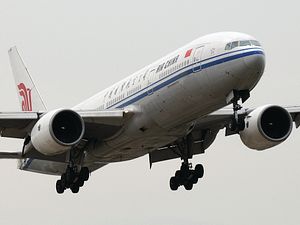The row over the new air routes in the west half of the Taiwan Strait, which China launched on January 4 without prior negotiation with Taiwan, raised immediate concerns over the island’s aviation safety and national security.
China’s unilateral decision this time is just another hostile gesture toward Taiwan since its pro-independence leader, President Tsai Ing-wen, was inaugurated in May 2016. Chinese President Xi Jinping froze all official dialogues with her due to the lack of mutual trust or a common political background. Xi’s move means that he regards the 1992 Consensus — which recognizes one China but with different interpretations — as the prerequisite in his Taiwan policy. Sadly, it is unfair but true.
In response to the new flight paths, Tsai has condemned the growing assertiveness from her Chinese counterpart and intends to seek support from the international community, particularly from the United States, but, honestly speaking, the result may not be desirable. China is not legally obligated to negotiate with Taiwan over these new routes in its own flight information region; though the International Civil Aviation Organization has suggested its members do so, there is no real regulation. There are no signs to show that the U.S. State Department will do anything more than call for a “constructive dialogue” between the two sides, which its spokesperson did when this issue was first raised by the press on January 5.
Looking back, the negotiations in January to March, 2015 between Taiwan and China, when these routes were first announced, was a success. At that time China agreed to indefinitely postpone the four new routes — the same ones it has now opened — while also agreeing to move the only open southbound route six miles to the west. Yet apparently, the negotiating leverage the previous government enjoyed does not exist for the current government. This is something that causes more worries.
Beyond statements, the Tsai government has now suspended additional flights scheduled during the Chinese New Year holiday for the airlines that have so far joined the traffic on the new routes. Unfortunately, this commercial sanction will not do the trick. It is not sustainable, and the punishment will fall on passengers, who are mainly Taiwanese businesspeople and their relatives coming back to the island for family reunions. It will backfire on Tsai.
During the presidential campaign, Tsai continued to promise that she would maintain the status quo in the Taiwan Strait, not the current impasse in cross-strait relations. If she really wants to remove the deadlock and regain Taiwan’s control in cross-strait politics, a readjustment in her mainland policy is inevitable. The question is how?
The solution may begin with a grand debate within the ruling Democratic Progressive Party (DPP), which it has lacked for two decades. The successful grand debate on mainland policy in 1998 helped the DPP forge a new consensus centering on the Resolution of Taiwan’s Future — a softer stance of seeking independence under the current constitutional order. That consensus paved the way for the DPP’s first administration taking power in 2000 and developed into the basic doctrine of the party’s mainland policy in later years.
A grand debate would allow Tsai to move a little bit forward from her current stance on mainland affairs. She may find some leeway through dealing with issues such as: How to make the current policy of maintaining the status quo more practical? Should the DPP freeze the independence clause in its party platform? Should the DPP forge another party resolution to accommodate the 1992 Consensus in a better way? Any conclusion would be able to reactivate her mainland policy, which has been static from the beginning of her presidency. There is no time to lose now.
Cross-strait relations are approaching a critical moment this year if one looks back to the cross-strait political pattern of the DPP’s first regime from 2000 to 2008. Back then, President Chen Shui-bian also released a mainland policy in his inauguration in May 2000 — the Five Nos: no independence; no change of the national title; no constitutional amendment for a state-to-state relationship; no referendum for independence or unification; no abolition of the unification council or the guidelines . Yet he found his goodwill caused no positive response from the mainland. Thus, Chen decided to turn back to his pro-independence stance by redefining his mainland policy as “One Country on Each Side” in 2002 in order to secure his second presidency in the coming election. This policy turn initiated the vicious cycle that continued to get worse and worse throughout the final six years of his presidency.
Two years into her first term, Tsai is facing the same situation as Chen. Hopefully, she will not make the same choice.
Dr. Charles I-hsin Chen is a Research Fellow at the Centre for Rising Powers, University of Cambridge. He received an economic Ph.D. from University of London and was Spokesman to Taiwan’s Presidential Office and the ruling Kuomintang Party from 2014 to 2016.

































